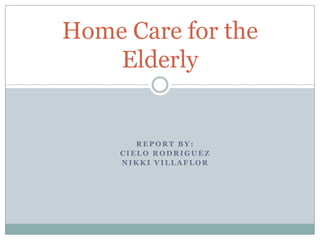
Home care for the elderly
- 1. Home Care for the Elderly REPORT BY: CIELO RODRIGUEZ NIKKI VILLAFLOR
- 2. PHYSICAL CHANGES Changes in Physical Aspects of the elderly: Slow reflexes Less efficient circulation Graying of hair and changes of its texture Slow bodily processes Loss of skin elasticity, underlying fat Skin becomes thin and more fragile Less accurate senses Posture becomes more stooped and walking becomes more difficult Loss of muscle strength and familiar tasks become more difficult Less accurate in sensing temperature of water and air Healing takes longer Decrease of or short-term memory
- 3. MENTAL CHANGES Cause mental changes in the elderly: Decreased brain circulation Medications Physical changes Social Changes Patient may be disoriented, forgetful, and irritable
- 4. PSYCHOSOCIAL CHANGES Reasons that may make retirement yield negative effects Presence of chronic diseases make them leave work early and sometimes make them disabled and dependent. Death of spouse may affect psychological outlook in life and are oftentimes devastating. Some may lose the will to live leading to serious physical and mental problems. Being out of work may lead to loss of their sense of belongingness, self-esteem, personal satisfaction, and usefulness. Some retired people maintain part-time work to promote usefulness and well-being. Decreased financial income results in lesser social and leisure activities, lesser food choices, and inability to afford medical services.
- 5. SOCIAL CHANGES Changes in social aspects: Retirement Change in income Change in level of activity Fear of illness Isolation from friends and family Death of spouse
- 6. Because of these changes, the elderly may: Become anxious, depressed or withdrawn, or may increase activity Change in eating habits, sleeping habits, or memory No longer show interest in those things they used to enjoy Suddenly develop an interest in activities they always disliked
- 7. Following activities may help elderly fight loneliness: Focus on hobbies Getting active with community activities Getting involved with church activities Joining family activities
- 8. Special Considerations In Caring for the Elderly
- 9. SAFETY Maintaining a safe environment through: Encourage them to discuss their capabilities realistically. Encourage properly-installed grab bars. Help provide lighting with switches that are easily to operate Encourage safe practice in the kitchen Set the thermostat on the water heater so that hot water is at a safe level. Plan emergency exits Help provide smoke detectors Encourage them to discuss their driving capabilities with their physician
- 10. EXERCISE Benefits of exercise: Increase strength of bones Increase cardiac and respiratory capacity Increase muscle strength and tone Decrease in weight Help maintain normal blood pressure Decrease in anxiety Better sleep habits
- 11. SLEEP Recommended sleep regimes for the elderly: Limiting intake of drinks with caffeine Creating a relaxing, pleasant atmosphere before going to sleep Developing regular sleep schedule Limiting naps and time spent without activity Creating a regular exercise routine Reviewing medications
- 12. MEDICATION The following can also be problems: They may stop taking medications due to financial reasons, forgetfulness, and being new about the drugs. The older body retains medications at a different rate than does the younger body The kidneys and liver of an older client remove waste products more slowly Older clients often forget they have taken medications and repeat them. Older clients may have several physicians each of whom may not be aware of all the medications that have been prescribed by other physicians.
- 13. FOOD AND NUTRITION Risk factors for malnutrition: Difficulties in chewing and swallowing Difficulties in procuring or preparing food Recent loss of spouse oral health problems Poverty Multiple drug abuse Confusion or depression Neurologic disorders Chronic lung disease Eating fewer than three meals a day Anorexia Inability to self-feed Alcoholism Altered taste and smell Diabetes Recent surgery Loneliness
- 14. ABUSE Some of the signs are: Bruises on a person that are hard to explain A request from a person not to be left alone with a particular person Conflicting stories from family members A “feeling” that things are not right Lack of family concern for the safety of the client Exchange of abusive words between family members Unexpected deterioration of the person’s health
